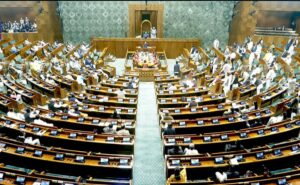Congress returns with only days to pass new coronavirus relief as pandemic rages

The U.S. Capitol Building is reflected against an ambulance along the East Front on Capitol Hill in Washington, U.S., July 16, 2020.
Tom Brenner | Reuters
Congress returns to Washington this week facing a critical deadline to pass another coronavirus aid bill as the pandemic tears through the United States.
Lawmakers in the divided Congress will need to quickly decide how to resolve broad differences on the best tools to both blunt an outbreak spreading unabated and lift an economy battered by the health crisis. They will also have to contend with a president who has repeatedly downplayed the pandemic’s severity as it jeopardizes his chances of winning another term in the White House.
As negotiations kick off in what could become a bitter process during an election year, millions of Americans left jobless by the pandemic wait to see whether their incomes will suddenly plunge at the end of the month. After July, people receiving unemployment insurance will no longer get an extra $600 per week from the government — even as the U.S. unemployment rate stands higher than it did at any point during and after the 2008 financial crisis.
At the same time, the U.S. struggles to contain a disease that has infected and killed more people nationwide than in any other country, according to data compiled by Johns Hopkins University. As the pandemic rages in Florida, Texas and other states, the country has now reported nearly 3.8 million Covid-19 cases and more than 140,000 deaths. The surge in cases has forced states such as California, the country’s largest, to roll back or pause their economic reopening plans.
Along with the enhanced jobless benefit — which is credited with boosting consumer spending while businesses are shut down — Congress will need to decide how to iron out differences on policies including liability protections for businesses, aid for state and local governments, direct payments to individuals and rent and mortgage assistance. Senate Majority Leader Mitch McConnell, R-Ky., aims to release an opening offer this week.
He and House Minority Leader Kevin McCarthy, R-Calif., met with President Donald Trump about the developing relief plan on Monday. The president, who has pushed for both businesses and schools to swifly reopen, can shape the views of GOP lawmakers in what he supports or opposes.
Treasury Secretary Steven Mnuchin, the lead White House negotiator on previous coronavirus bills who also attended the meeting Monday, said he will start reaching out to Democrats to start bipartisan talks. Trump’s economic advisor, who reiterated the Republican desire to start with a roughly $1 trillion bill, said he and White House chief of staff Mark Meadows will attend the Senate GOP policy lunch on Tuesday.
As details of McConnell’s legislation started to trickle out in news reports, his Democratic counterpart Chuck Schumer criticized key provisions on Monday. The Senate minority leader particularly took issue with a GOP proposal that would reportedly limit coronavirus-related lawsuits to “gross negligence or intentional misconduct,” along with a Republican push to cut or revise the boosted unemployment benefit.
“Unfortunately, by all accounts the Senate Republicans are drafting legislation that comes up short in a number of vital areas, such as extending unemployment benefits or funding for rental assistance, hazard premium pay for frontline workers, or investments in communities of color being ravaged by the virus, and many other necessary provisions,” the New York Democrat wrote in a letter to colleagues. “Democrats will need to fight hard for these important provisions.”
Any bill will have to get through both the Republican-held Senate and the Democratic-controlled House. As lawmakers work on a tight timeline, efforts to appease House Democrats could dampen support among Republican senators — and vice versa.
Along with the critical deadline to craft financial support for unemployed Americans, a planned recess for all of August adds to the pressure Congress faces. House Speaker Nancy Pelosi, D-Calif., has said she would delay her chamber’s month at home to pass an aid bill, though it is unclear if McConnell would take the same step in the Senate.
The House passed a sweeping $3 trillion rescue package in May, but Republicans dismissed it as unrealistic. Both GOP leaders and Pelosi have pegged the cost of the Republican plan at roughly $1 trillion, though the speaker has said it is “not enough” money to address the crisis.
On Monday, Sen. John Barrasso — a Wyoming Republican and third-ranking member of his caucus — told CNBC that the GOP aims to craft a “recovery” rather than “stimulus” bill.
He said senators will focus on whether a plan will “help people get back to work and kids get back to school,” and whether it will “help save lives” by supporting testing, treatment and vaccine development. Barrasso called for “flexibility” for states and municipalities in how they use already approved aid designed to cover lost revenue and increased expenses during the pandemic.
The senator echoed other Republicans in arguing Congress should do away with the $600 weekly benefit because many people make more money at home than they would at their jobs.
“To me, that would be a heavy wet blanket on the economy,” he said about extending the enhanced insurance. House Democrats proposed to continue paying the benefit through January, while Democrats including Schumer put forward a version that would phase it out as state unemployment rates fall.
Some researchers have disputed that continuing the assistance would harm the economy or dampen job growth. Josh Bivens, director of research at the left-leaning Economic Policy Institute, estimates that ending the $600 per week payment outright would “severely” reduce GDP as it would reduce spending in the households most affected by the economic turmoil.
He said enhanced unemployment insurance, combined with hazard pay for essential workers and strengthened job safety standards, which Democrats also want in the next bill, are “good economics and good health policy” as many Americans “face the choice of unsafe work or poverty.”
Mark Mazur, director of the Urban-Brookings Tax Policy Center, said letting the enhanced insurance expire outright “almost certainly would deepen and prolong the recession, perhaps greatly.” Not buoying Americans’ wallets now, whether through extending the jobless benefit, sending direct checks, offering rent and mortgage relief or some combination of the three, poses the risk that “consumer spending drops precipitously and that there are large numbers of foreclosures and mortgage defaults and that many more Americans go hungry,” he said.
As they did in the bills that authorized more than $2.5 trillion in pandemic aid earlier this year, corporations are looking for benefits in the next piece of legislation. Certain companies want to see a tax credit “cash-out” included in the proposal, according to The Wall Street Journal.
The New York Times also reports that industries from airlines to hotels and restaurants want relief in the bill as the pandemic worsens.
It remains to be seen who all will get a cut of the federal money as Republicans try to control the bill’s price tag. Trump’s desire to downplay the health crisis could complicate matters even more.
For instance, as the president falsely claims the severity of the U.S. outbreak is due only to strong testing capacity, his administration wants to block new funding for coronavirus testing and tracing. Both Republican and Democratic leaders want funds for testing in the developing relief bill.
In the meeting with GOP leaders on Monday, Trump also highlighted progress toward a vaccine — developments he has repeatedly touted as he struggles to control the pandemic. The president added that he plans to resume daily briefings on the virus this week, redeploying a tool he used to try to control the pandemic narrative early in the U.S. outbreak.






